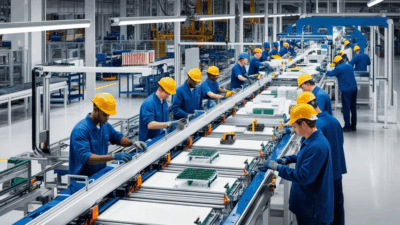Will you lose your job to artificial intelligence? How AI is changing the game

Artificial intelligence insights
- The impact of artificial intelligence (AI) on manufacturing: How AI is improving efficiency, quality control and inventory management while also posing challenges for workers and cybersecurity.
- From predictive maintenance to process optimization, the benefits and challenges of integrating AI technologies in plant operations abound.
Artificial intelligence (AI) is transforming every industry and manufacturing is no exception. In the past, manufacturing was a tedious and labor-intensive process, but with the advent of AI, the sector is becoming more efficient and streamlined. AI technologies can help plant engineers and managers achieve higher levels of productivity and quality. Here, I will explain — using ChatGPT, the AI chatbot tool — how AI will aid manufacturing plant engineers and plant managers in their job.
One of the main advantages of AI in manufacturing is predictive maintenance (PdM). PdM involves analyzing data from machines to predict when they are likely to fail. This information allows plant engineers to take preventive measures before the machines break down, saving time and money. By implementing AI technologies, plant managers can reduce downtime and maintenance costs, leading to increased productivity and efficiency.
Another way that AI can aid plant engineers and managers is through quality control. Quality control is an essential aspect of manufacturing and AI can help improve it by detecting defects and anomalies in products during the production process. This means that plant managers can catch problems early, preventing them from reaching the end customer. In turn, this will lead to higher customer satisfaction and fewer returns.
AI can also help plant managers optimize their production processes. By analyzing data from machines and sensors, AI can identify areas where efficiency can be improved. This information can then be used to optimize production schedules and reduce waste. The result is a more efficient manufacturing process that can produce more products with fewer resources.
Moreover, AI can help plant managers manage their inventory better. By analyzing customer demand, AI can predict which products will sell the most and which ones will be less popular. This information can be used to adjust inventory levels, ensuring that the right products are always in stock. This will prevent overstocking or understocking, leading to more satisfied customers and higher profits.
However, some critics argue that AI will replace human workers in the manufacturing industry. While it is true that some jobs may become obsolete, AI will create new jobs in the industry. According to a 2020 report by the World Economic Forum, AI was predicted to create 133 million new jobs globally within two years (too bad it didn’t predict COVID-19).
In conclusion, AI has the potential to revolutionize the manufacturing industry and plant engineers and managers will benefit from its implementation. AI technologies can improve productivity, quality and efficiency, while reducing costs and downtime. While some jobs may become obsolete, AI will create new opportunities for workers in the industry. It is up to plant managers and workers to embrace AI and develop the skills necessary to thrive in the new era of manufacturing.
This content was enhanced with ChatGPT. Due to the limitations of AI tools, all content was edited and reviewed by our content team.



